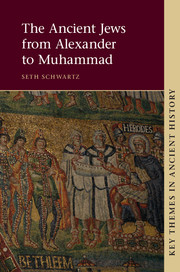Book contents
Introduction
Published online by Cambridge University Press: 05 June 2014
Summary
The administration of Ventidius Cumanus as governor of Judaea (48–52 ce) was, according to the historian Josephus, an ominous one for the Jews, featuring several cases of provocative military misbehaviour and the governor’s anti-Jewish intervention in a civil mini-war between Jews and Samaritans, which ended badly for everyone, including the governor. On one occasion, though, Cumanus’ decisive action forestalled what would otherwise have quickly degenerated into mass rebellion. Some Roman troops, on patrol in the western Judaean hills in the wake of an attack on an imperial slave, found in one village a scroll of the Law of Moses, and one of the soldiers cut it to pieces and burned the scraps. News quickly spread, and the Judaeans, ‘aroused as though it were their whole country which had been consumed in flames’, marched en masse to the governor’s palace in Caesarea Maritima, where Cumanus found the responsible soldier and had him executed. ‘On this, the Jews withdrew’ (Jewish War 2.228–31).
Is this episode self-explanatory, or deeply bizarre (Schürer-Vermes i:456–7; S. Schwartz 2001:60–1)? We live in a world where group symbols are destroyed in acts of provocation which everyone seems to understand. Flag-burnings are routine and routinely cause outrage. The public burning of a copy of the Quran by an extremist Protestant pastor in Florida sparked violent protests in Afghanistan, but, perhaps more relevant to the pastor’s stated intentions, offended enlightened opinion at home. Public outrage at the provocative treatment of central Christian symbols is also familiar. Nearly twenty-five years after its creation, according to a story widely circulated on the Internet, Andres Serrano’s notorious Piss Christ (a photograph of a plastic crucifix suspended in what was allegedly the artist’s urine) was attacked and destroyed by pious Catholics in Avignon in April 2011. The fact that this story appears to have been at the very least greatly exaggerated suggests that whatever happened functioned primarily as a convenient peg on which to hang a larger debate on the embattled secularism of the French Republic. Personally offended and wary of controversy, authorities in the late 1990s routinely banned display of Chris Ofili’s Holy Virgin Mary, a painting composed partly of elephant dung; it was subsequently purchased by a collector and now hangs peacefully in Tasmania.
- Type
- Chapter
- Information
- The Ancient Jews from Alexander to Muhammad , pp. 1 - 18Publisher: Cambridge University PressPrint publication year: 2014



